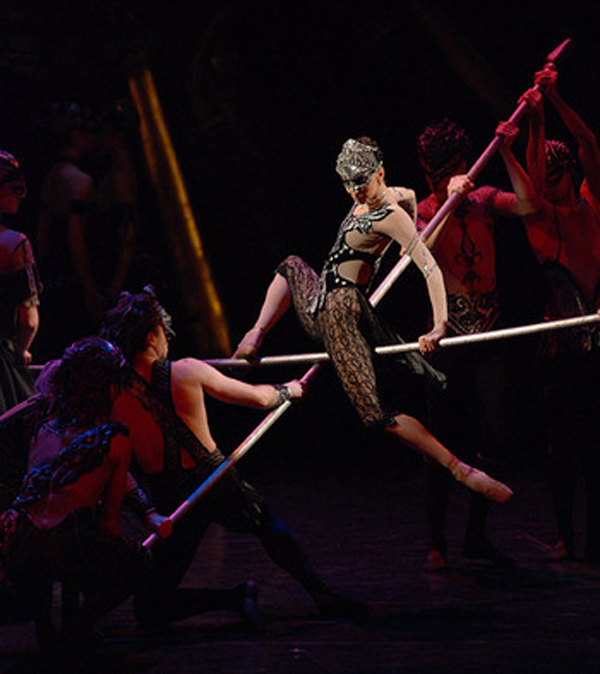
The American premiere of Boris Eifman’s “Russian Hamlet (The Son of Catherine the Great)” is one of the many highlights of the Eifman Ballet of St. Petersburg’s return engagement to City Center, March 29-April 16. Produced by Ardani Artists, the spectacular three week season will also feature performances of three of the ballets that brought American audiences to their feet during the troupe’s two previous visits: “Red Giselle,” “My Jerusalem” and “Requiem.”
Although “Russian Hamlet” was premiered in Poland by the Eifman Ballet last June, the work was originally commissioned by the Bolshoi Ballet, which premiered it at the Bolshoi Theater this February. “Russian Hamlet” marks the first of Eifman’s work to be performed by another Russian company.
Suggesting the glittering court of Catherine the Great, Eifman’s “Russian Hamlet” is a powerfully told tale based on the tortuous life of Catherine the Great’s only child, Paul. In his desire to parallel and distinguish between the Danish Hamlet and Paul, the son of Catherine, Eifman does not hold to absolute fact, but rather recreates aspects of the bloodstained history to make his philosophical point. Eifman deliberately does call the characters by their historical name in order to universalize his points, so that Catherine is referred to as “The Empress” and Paul as “The Son of the Empress,” etc.
Full evening in length and divided into two acts, the ballet traces Paul’s tragic life insurgents, while revealing the damning emotional, psychological and spiritual effects it had on the rest of his tragic life. Paul’s obsessive desire for his mother’s death is dramatically revealed in phantasmagoric episodes. Believing that music represents the spiritual life of people, Eifman selected compositions by Beethoven and Mahler, both German, to reflect the original German heritage, but dramatically different spirits, of Catherine and Paul.
The season’s other ballets, “Requiem” and “My Jerusalem,” will be on a shared bill. Both works are plotless. “Requiem,” set to Wolfgang Amadeus Mozart’s masterpiece of the same name, is a meditation on birth, maturity and death. In “My Jerusalem,” Eifman, who uses three soloists to depict the three religions that exist in that city, suggests the possibility of the reconciliation of their differences. Reinforcing the sense of disunity and possible connection, the ballet is set to a combination of the percussive, techno-rock music of Richard Wahnfried and Jorg Schaaf and the more traditional sounds of Sergei Rachmaninoff, Wolfgang Amadeus Mozart and ethnic and religious music.
“Red Giselle,” a work of fantasy based on the real–and tragic–life of the Russian ballerina Olga Spessivtseva, will also be performed. Taking its title from the ballerina’s identification with the classic ballet heroine, “The Red Giselle” explores Spessivtseva’s life from both in and outside of her mind. This includes her fleeing from Russia in 1923, the betrayal by her French lover, her greatness as a dancer and her ultimate descent into madness.
The music for the ballet is by Peter Tchaikovsky, Alfred Schnittke, and Georges Bizet Part of a new generation of independent Russian choreographers who sought individual expression, Boris Eifman founded the Eifman Ballet of St. Petersburg in 1977. Dependent completely on box office for support, it has never received State subsidy.
A graduate of the choreography department of the Leningrad Conservatory, Eifman was the choreographer for the Vaganova Academy of Russian Ballet, creating ballets for the Kirov and Maly Theaters. He has created over 40 works, ranging from rock ballets to ballet buffo; fairy tales and works based on dramatic literary themes.
